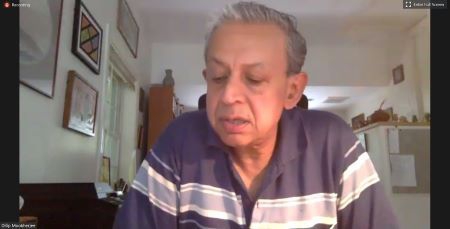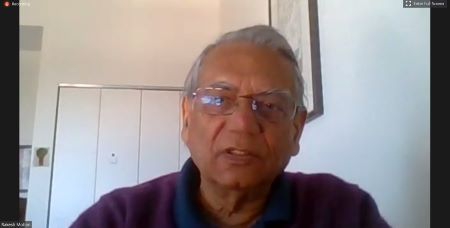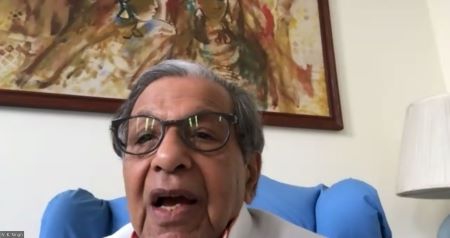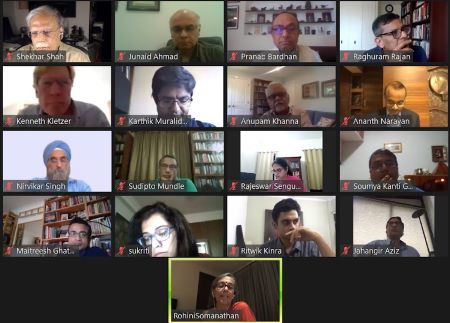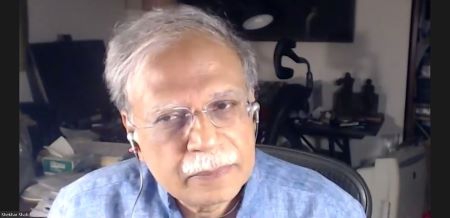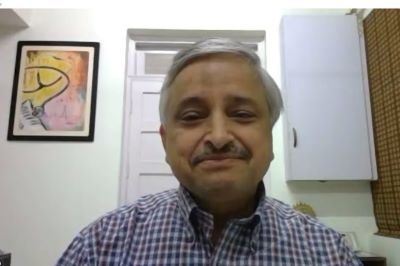NCAER held the 17th India Policy Forum (IPF) virtually during July 13-16 2020, a first for the conference. The IPF is organized by NCAER under the guidance of NCAER Director General Dr Shekhar Shah, who is assisted by his IPF co-editors, Dr Barry Bosworth of the Brookings Institution in Washington D.C., and Professor Karthik Muralidharan, Tata Chancellor’s Professor of Economics at the University of California, San Diego. Arvind Subramanian, former Chief Economic Adviser for India, has called the IPF “the leading economic policy event in the summer season of Delhi.”
Taking advantage of its worldwide reach, the 2020 IPF turned out also to be a truly global event, featuring a much larger audience than usual with over 200 researchers, including two Economics Nobel Prize winners, senior policymakers, and eminent panelists from India and overseas. With India in July 2020 facing massive health and economic challenges unprecedented in its history, the 17th NCAER IPF focused on high-calibre discussions around the key health and economic challenges facing the nation, all based on rigorous research by some of the best economists worldwide working on India.
While inaugurating the 17th IPF and welcoming participants, Dr Shah outlined the particular importance of the IPF in these difficult times as it brought together incisive policy research, ideas, and evidence-informed pathways to respond to the pandemic. During the four days of the IPF 2020, over 30 authors, discussants, and chairpersons engaged on four IPF research papers and two high-level round-table discussions around the safety net, economic growth, and jobs challenges of the Coronavirus pandemic. The IPF papers and the Policy Roundtables 1 and 2 are listed in the hyperlinked IPF programme below containing links to the IPF papers, slide presentations, and individual session videos.
The four-day event began with a felicitation for longtime IPF Advisory Panel members, MIT Professors Esther Duflo and Abhijit Banerjee, the winners of the 2019 Nobel Prize for Economics. The felicitations were marked by deep appreciation of both their professional achievements and their personal qualities of generosity, compassion, and commitment to the cause of bettering the lives of people through research. Speakers included Karthik Muralidharan, Pranab Bardhan, Dilip Mookherjee, Maitreesh Ghatak, and. besides Shekhar Shah, former Director Generals of NCAER Rakesh Mohan and Suman Bery. Muralidharan applauded Duflo and Banerjee for “transforming developmental economics from a theoretical field to one of cause and effect, and for ushering in change through evidence-based policy research.” Bardhan noted that the India Policy Forum was a particularly apt venue for celebrating the work of Banerjee and Duflo because “the IPF has always showcased transformative research that has consistently influenced policy”.
Professor Pronab Sen, Programme Director, International Growth Centre, India, and former Chief Statistician of India then delivered the 2nd T N Srinivasan Memorial Lecture on Data in the Times of the Coronavirus. The session was chaired by Mr Amitabh Kant, CEO NITI Aayog. In his opening remarks, Kant highlighted the need for real-time, granular data, perhaps even at the district or sub-district level in dealing with the coronavirus pandemic.
While delivering the T N Srinivasan Memorial Lecture, Professor Pronab Sen’s noted that developing countries that have low resilience and capacity to deal with crises ironically require data that permits decision-making in near real time. Cross-sectional data that most developing countries collect is not well suited to this. For this he urged governments to blend panel data sets with cross-sectional data and to use administrative data much more thoroughly and rationally. For India he urged the use of high-frequency and highly granular GST data for mapping economic activity.
The full text of his Lecture is available here.
The four IPF papers, all built around the ongoing pandemic, were presented sequentially through July 14 to 16. Details of the paper authors, chairs, and discussants are in the programme below. Against the backdrop of the pandemic, Prachi Mishra presented her paper on the state of the economy, Ajay Shah on health policy, Barry Eichengreen, Poonam Gupta, and Rishabh Choudhary on inflation targeting, and Anirban Sanyal and Nirvikar Singh on structural change among the Indian states. Among the high-level participants, the IPF was privileged to have two former RBI Governors and one Deputy Governor, the Union Health Secretary and the Union Expenditure Secretary, the head of the All India Institute of Medical Sciences, the Chairman and a Member of the 15th Finance Commission, and at least two former Chief Economic Advisers.
With the pandemic in the background, the IPF also hosted two policy roundtables on the lessons of the pandemic for meeting the challenges of India’s safety nets, economic growth, and employment. Details are available in the hyperlinked programme below.
The IPF Editors, Shekhar Shah, Barry Bosworth, and Karthik Muralidharan closed out the IPF 2020 on July 16th noting the considerable positive feedback they had received from the participants suggesting that this IPF was one of the best IPF in recent times despite it being the first IPF held virtually in 17 years.






